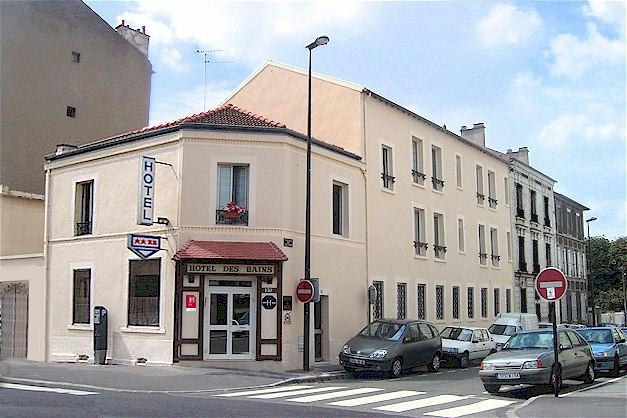Étiquette : CNRS
A gigantic hydrogen deposit in northeast France?
Researchers have discovered a potential natural hydrogen deposit under the coalfields of the northeastern French Lorraine region – possibly the world’s largest reserve of this gas!
The dawn of digital oncology
In the southwestern French town of Toulouse, a team of experts in computer science and oncology is developing software to improve the management of patients and accelerate research.
Wanda Diaz-Merced, the astronomer who listens to the stars
Blind since her teenage years, Wanda Diaz-Merced has developed a technique called “sonification” to convert astrophysical signals into sounds. Building on the success of this impressive tool for research and inclusion, she is an eloquent advocate for m…
Hydrogen The green revolution ?
In the quest for a sustainable alternative to fossil fuels, hydrogen is a serious contender. But it still has to be tamed… In this report, a number of researchers and industrialists retrace the long scientific and technical history of hydrogen, a pro…
Cryptocurrencies beyond the buzz
An amazing invention or a public danger? In their soon-to-be fifteen years of existence, cryptoassets have shown that they are a source of opportunity as well as risk, and pose challenges for regulators. These issues have drawn the attention of researc…
The endless cycle of pandemics
Conditions remain conducive to the emergence of new pathogens capable of triggering pandemics. Environmental degradation and the ever-faster movement of people and goods are compounded by the extraordinary adaptability of bacteria, viruses and fungi.
Euclid on a quest to understand dark energy
The expansion of the Universe is accelerating as a result of an enigmatic phenomenon called dark energy. To try to discover what this really is, the Euclid space telescope has been launched on a six-year observation mission that could totally change th…
Urbex, the thrill of urban exploration
Exploring disused sites such as factories, barracks, and former sanatoriums – regardless of danger or whether it is permitted – has become a social phenomenon. The historian Nicolas Offenstadt, an urbex specialist and enthusiast, has delved into this g…
Bodily waste: matter for thought
How do wealthy industrialised societies dispose of their excrement? Research led by the anthropologist Marine Legrand on contemporary management methods for human urine and faecal matter provides an overview. A subject that is both surprising and fasci…
The history of the Amazonian climate lies on the seabed
Until 3 July, a major oceanographic campaign is being conducted off the coast of Brazil. Among other things, the researchers are coring marine sediments, collecting atmospheric dust, and sampling water, all with the aim of elucidating the role of the …
Neanderthals were artists too
Engravings discovered in France, in the Loire valley, are the work of Neanderthals, confirming that our distant cousins were not cognitively inferior to modern humans of that period.
Amazonians face the dilemma of deforestation
Whether urban or rural, younger or older, inhabitants of the Amazon basin are torn between protecting the forest and promoting economic development. The CNRS researcher Lauriane Mouysset has launched the Amazonas project, which combines science and pho…
Boarding the ships of the APERO campaign
APERO, one of the most ambitious oceanographic campaigns in recent memory, takes on the challenge of studying the biological carbon pump in the mesopelagic zone, located between 200 and 1,000 metres below the ocean surface.
Modelling the lungs for personalised medicine
Modelling lung mechanics on all of the scales characteristic of the organ is currently lacking, especially when it comes to understanding the diagnosis and treatment of pulmonary fibrosis. To meet this need, researchers are developing an algorithm that…
The deep seabed, a little-known world under threat
Deep sea mining in international waters could be authorised as early as this year. And yet by affecting the ocean’s ability to store carbon, there is a risk this industry could endanger ecosystems whose value and importance scientists are only just beg…
The deep seabed, a little-known world under threat
Deep sea mining in international waters could be authorised as early as this year. And yet by affecting the ocean’s ability to store carbon, there is a risk this industry could endanger ecosystems whose value and importance scientists are only just beg…
The birth of exoplanets
Located at an altitude of 2,500 metres on the Bure plateau in the Alps, the Noema international observatory is the most powerful radio telescope in the northern hemisphere. Thanks to the data collected by its twelve antennas pointed in the same directi…
Political propaganda on record
Political speeches, militant or folk songs… discover a few priceless gems from the over 900 propaganda records produced in France in the twentieth century by political organisations of all stripes. The brand new PSXX platform brings together this for…
Antennas to observe the Universe
Located at an altitude of 2,500 metres on the Bure plateau in the Alps, the Noema international observatory is the most powerful radio telescope in the northern hemisphere. Thanks to the data collected by its twelve antennae pointed in the same directi…
The holy Hittite city of Zippalanda finally identified
Historians who decipher cuneiform texts frequently discover names of ancient cities that they are unable to locate on a map. In addition, the original designations of many sites excavated by archaeologists in the Near and Middle East have yet to be det…
The truth behind the placebo effect
Even without deception, a placebo can still be effective – provided certain precautions are taken before it is administered. A study by CNRS experts at the TIMC interdisciplinary health laboratory offers an explanation.
Reconciling people and wildlife in the Okavango
In Botswana’s Okavango Delta, thousands of local villagers suffer the consequences of coexisting with protected wildlife species: livestock attacked by lions, crops destroyed by elephants… The researchers of the ProSuLi project are trying to find solut…
Neuroscience to the rescue against sexual violence
Although a global scourge, sexual violence is by no means inevitable. It can be curbed, in particular thanks to recent discoveries on the brain and its phenomenal plasticity. The neurobiologists Danièle Tritsch and Jean Mariani, authors of Sexe et Viol…
Presenting the world’s oldest architectural plans
Engraved on stones and dated to 8,000 and 9,000 years ago, the oldest known plans to scale have recently been published in the journal PLOS ONE. They depict gigantic prehistoric structures known as “desert kites” that were designed to trap wild animals…
Towards environmentally-friendly cryptoassets?
Bitcoin and cryptocurrencies have been criticised for the huge amounts of electricity required to make them secure. Researchers are exploring new pathways towards more virtuous blockchains.
Fighting antibiotic resistance
The proliferation of resistance to treatments against infections is a threat to human health. To face up to this situation, scientists are tracking the appearance and spread of the genetic determinants that help pathogens fight antibiotics, and are con…
Fighting antibiotic resistance
The proliferation of resistance to treatments against infections is a threat to human health. To face up to this situation, scientists are tracking the appearance and spread of the genetic determinants that help pathogens fight antibiotics, and are con…
The IPCC issues uncompromising conclusions on climate change
Rounding off eight years of work, the Intergovernmental Panel on Climate Change recently published its sixth Synthesis Report. The CNRS research professor Gerhard Krinner, who coordinated part of it, tells CNRS News about this document, which was appro…
Understanding and reproducing ritual objects via ethnomimetics
Discover how scientists and indigenous populations work closely together to replicate traditional ritual objects so as to preserve them, while respecting ancestral know-how.
Smart grids are essential to the ecological transition
Sensors and artificial intelligence are now part of electrical grids, creating more “intelligent” networks known as smart grids. The researcher Nouredine Hadjsaid explains the issues and challenges raised by these new systems designed to optimise the b…
Cosmology in turmoil
Two separate measurements of the Hubble constant, a parameter that describes the expansion rate of the Universe, have yielded conflicting results. The discrepancy could lead to the overthrow of the standard model of cosmology.
Friendly bacteria
For several years now, microorganisms have been gravitating from the lab benches of biologists towards the test tubes of chemists. The aim is to study bacteria from a new angle with the prospect of developing novel therapeutic solutions.
Can international law save the oceans?
Now that negotiations for an international treaty aimed at strengthening protection of the oceans have successfully concluded in New York, Pascale Ricard, a specialist in international environmental and maritime law, tells CNRS News about the regulatio…
Can international law save the oceans?
Now that negotiations for an international treaty aimed at strengthening protection of the oceans have successfully concluded in New York, Pascale Ricard, a specialist in international environmental and maritime law, tells CNRS News about the regulatio…
Saving the ice record in Svalbard’s glaciers
The Ice Memory Foundation, which collects ice samples from around the world, is launching a new expedition to the Svalbard Archipelago in Norway. The aim is to collect two ice cores containing the climate and environmental record of the past 300 years.
Spyware in mobile games
Games on mobile phones collect all kinds of personal information without our knowledge. The computer science researcher Pierre Laperdrix and his team have studied this surveillance ecosystem and its impact on users.






